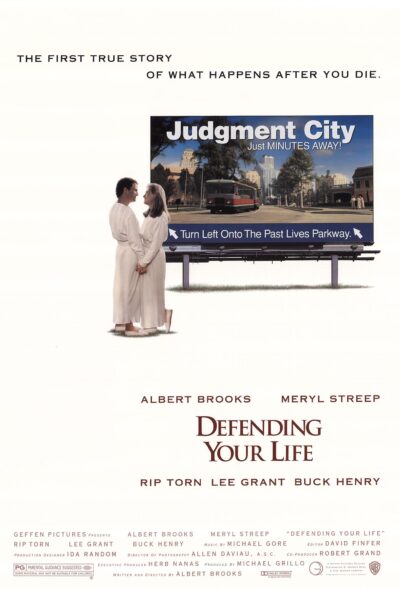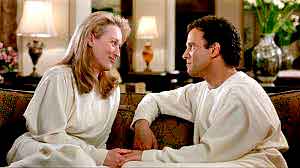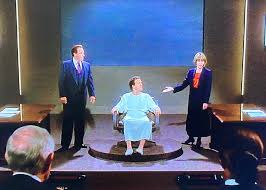The afterlife comedy formula is a popular one, having fueled classic films like A MATTER OF LIFE AND DEATH (1946) and HEAVEN CAN WAIT (1978), and non-classics like THE HEAVENLY KID (1985) and HEART AND SOULS (1993). DEFENDING YOUR LIFE, a 1991 film from writer-director-star Albert Brooks, ranks as one of the better examples of afterlife themed comedy, and is in my view the highlight of Brooks’ directorial oeuvre, which includes REAL LIFE (1979), MODERN ROMANCE (1981), LOST IN AMERICA (1985) and MOTHER (1996).
The afterlife of DEFENDING YOUR LIFE is one of the most unique and distinct on record. There are no mist shrouded backgrounds or people with wings to be found here; rather, what we get is a sprawling retirement community called Afterlife City where the recently deceased, most of them elderly, are put on trial to determine their future status. If a person is found to have lived well s/he advances to a higher plain, but if not the person gets sent back to Earth for another try.
In the case of Daniel Miller (Brooks), a Los Angeles advertising executive in his early forties, he’s killed in a head-on collision with a bus. Early cuts of the film included a great deal of footage showing Daniel’s life on the Earthly plain, but test audiences rejected it. I say those audiences were correct, as the character is a variation on the same befuddled yuppie Brooks always plays in his films; his interesting qualities accrue in the afterlife scenes.
In Judgement City Daniel is forced to review nine scenes from his life in the company of the tough prosecutor Lena (Lee Grant) and kindly defender Bob (Rip Torn). In contrast to the Greeks, whose major question about a person’s life was “Did you have passion?,” Judgement City’s overriding query is “Did you have courage?” Lena argues that Daniel lived his life in a cowardly manner while Bob steadfastly maintains otherwise. In the meantime, Daniel meets the comely middle-aged Julia (Meryl Streep) at an afterlife comedy club and attends a Shirley MacLaine hosted Past Lives Pavilion, in which Daniel views a former incarnation he dubs “dinner” (meaning an African tribesman being chased down by a wild animal). Eventually he finds himself alone with Julia but can’t work up the courage to be intimate with her, gets his verdict handed down and heads off to meet his fate…
DEFENDING YOUR LIFE is, like its setting, resolutely talky and low-key. Brooks favors subtle, character-based comedy, with little in the way of action or sensation. This tends to make for smart and observant films like REAL LIFE and LOST IN AMERICA that are also, frankly, pretty boring.
As with those films, DEFENDING YOUR LIFE’s pleasures are intellectual rather than visceral. Its philosophical concerns are best not pondered too deeply (is returning to Earth from Judgement City to live another life really the terrible fate it’s made out to be?), but from a metaphorical standpoint the proceedings are quite rich, conveying one of Hollywood’s favorite messages—the necessity of living a life with a minimum or fear—with grace and genuine wit.
The uplifting score by TERMS OF ENDEARMENT’s Michael Gore is excellent, and the performances are top-notch. Meryl Streep, at a point in her career when she was attempting to reestablish herself as a comedic actress (having made SHE-DEVIL, POSTCARDS FROM HELL and DEATH BECOMES HER around the same time), is solid as the too-good-to-be-true love interest, while Rip Torn and Lee Grant deliver what are arguably their finest late period acting turns. Albert Brooks himself, as already stated, essentially plays the same part he always does, yet performs some distinctly out-of-character acrobatics in the final scene—which unlike his other films (which tend to be burdened with lousy endings) concludes things on an exhilarating note of well-earned optimism.
Vital Statistics
DEFENDING YOUR LIFE
Geffen Pictures
Director: Albert Brooks
Producer: Michael Grillo
Screenplay: Albert Brooks
Cinematography: Allen Daviau
Editing: David Finfer
Cast: Albert Brooks, Meryl Streep, Rip Torn, Lee grant, Julie Cobb, Peter Schuck, Time Winters, Gary Beach, Sharlie Stuart, Beth Black, Clyton Norcross, James MacKrell, Will Albert, Sage Allen, Mary Pat Gleason, Maxine Elliott Hicks, Marilyn Rockafellow, Roger Behr, Shirley MacLaine




